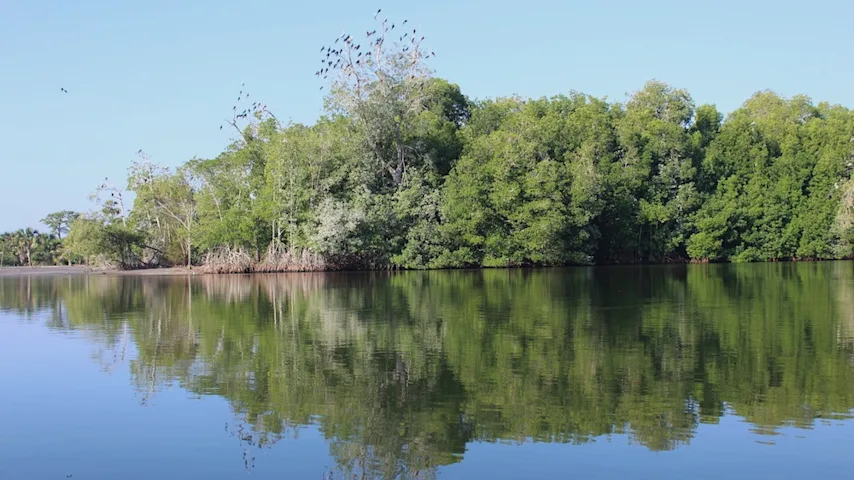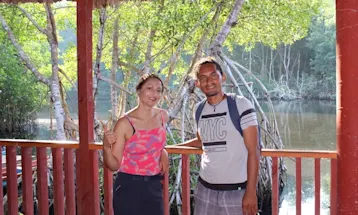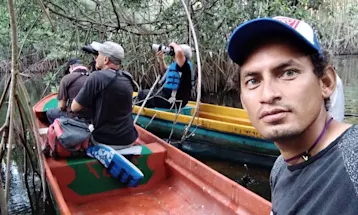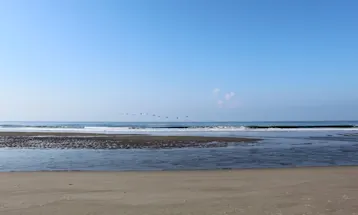El Castaño: ecosystem restoration that encouraged the return of native birds and the arrival of ecotourism

Camellia Williams
El Castaño is a small fishing village in Chiapas, on the Pacific coast of Mexico. It sits within the La Encrucijada Biosphere Reserve, a network of mangroves, marshes, coastal dunes, and tropical forests that thrive with life. Ecosystem restoration in El Castaño has created a haven for around 300 species of native, endemic, and migratory bird species and provides opportunities for ecotourism that supports the conservation of this beautiful place.
Ada Basauri Molina, our Local Lead in Mexico, met with the El Castaño community to learn more about their work.

Ada: Hello Mario, can you tell us a little more about Chiapas, and yourself?
Mario: Okay, a hello from your friend Mario here "The Chestnut", a common space inside the reserve "La Encrucijada" in the municipality of Mapastepec in Chiapas. I am 34 years old, I was born here and I've lived here all my life so I love all the nature here. I would like to tell you about the evolution and journey that this community has been through.
Ada: Thank you. What does your community do to restore the local ecosystems?
Mario: We are fortunate enough to find ourselves surrounded by an ecosystem that is immensely diverse. While it may look beautiful today, it's taken a lot of tiring work to get us to a point where we can say that we've managed to welcome back all of the 300 native, endemic, and migratory bird species.
The land that is upriver has issues with deforestation and forest fires which affects us downstream. We clean the estuaries once a week to remove all of the trash that is carried downstream. We dig new channels so that the water can reach and flow to all the corners of the reserve that it naturally would, and it can continue to support all the life that it's supposed to.
Now ecotourists come to the reserve, which has positively impacted both the social and ecological aspects of the local community. Ecotourism allows us to market the birds and the mangroves in a way that allows them to continue to thrive. The better the land is conserved, the more ecotourists we'll be able to welcome, and that in turn allows us to better conserve the ecosystem. That's why we invite all the civil groups, NGOs, and everybody to help us conserve the lungs of the earth which, I think, will help ensure the survival of the human race. This massive mangrove forest is spread across four municipalities and it's so important to protect it.

Ada: And how about the work you do to conserve some emblematic species? I remember you told me about some efforts to conserve a species of Caiman?
Mario: We have the Spectacled Caiman (Caiman crocodilus) here and we also have the American Crocodile (Crocodylus acutus) which is displacing the Spectacled Caiman. We work with CONANP on a project to collect the caiman eggs and place them in secure spots since they have so many predators. This way, we will continue to see the Caimans for a long time and future generations can continue to get to know this beautiful and noble species and commit themselves to protecting it.
The American Crocodile is larger and can live in either freshwater or saltwater. The crocodile feeds on the Caiman, displacing it from the reserve. The Caiman on the other hand only survives in freshwater and every year we see fewer Caimans. I think in the future we will have to sit down with the responsible governing body to discuss a management plan for the crocodiles because they are reproducing too quickly, there are just too many of them and too few Caimans. It's really important to protect the Spectacled Caiman because you can only find it here in Chiapas and in a small part of Costa Rica.
Ada: Finally I want to ask you, what would you like your community to look like in 10 years?
Mario: Well, ecotourism is really growing a lot, but we don't want to lose the essence of the community. We don't want big buildings or lots of noise, because the main goal is always conservation. We want more tourists, but we want tourists who are conscious of nature and don't come to destroy, but rather join us in our efforts to conserve places like this which are continuing to disappear.
I would like to see my community and its commitment to nature grow. I would like us to know more about natural resources, and love the nature around us. I don't see it growing in terms of big buildings and losing that originality that nature gives you.

Ada: Thank you, Mario. Thank you for being part of this new global community for ecological restoration.
Mario: Finally, to those reading this, I invite you to join us, to meet me in some corner of Chiapas and come to see this reserve and the magical world that is this mangrove forest, with all of its secrets.
Visit La Encrucijada on Restor